Experts say this environmental disaster is rapidly getting worse for the Caribbean
The debate over global warming rages on. People on both sides argue about the seriousness, and if it is even real. If we accept that the average temperature of our planet is increasing, it doesn't mean that we agree on the cause. And what is at the heart of the most important discussions is how we can prevent it from getting worse. There are still a few people who insist that we don't need to be concerned or do anything at all.
But no matter which side of the debate we are on, we can't ignore the fact that credible scientists and research groups are pointing to two undeniable facts. The first is that the earth's average temperature is noticeably higher now than it was a few decades ago. The second is that we are seeing changes to wildlife and the environment that are long lasting or tragically permanent.Melting polar icecaps is one one example.
One of the recent disasters that many people have experienced personally is the record accumulation of sargassum plants on the beaches in the Caribbean. This free-floating weed accumulates in huge masses naturally, creating habitat and cover for many marine animals. In the right amounts, it can shelter coral reefs and provide nurseries in the middle of the ocean for tiny fish and vertebrates. It has been credited with creating entire ecosystems where they would otherwise not exist.
But, like many good things, too much of it can spell disaster. Sargassum has flourished unnaturally since 2011 and has grown into masses that are hundreds of miles across. Changing tides and increased growth has caused entire shorelines to become choked by its presence. In great masses, it shades coral and plants that grow along the shore, preventing them from thriving. It rots and drops debris on corals, further choking and killing them. Without coral, almost all ocean ecosystems suffer greatly.
The effect on nesting sea turtles and other shore creatures has also been a big concern, with researchers saying that the accumulation on the beaches will affect sea turtles' ability to find and dig suitable nesting sites. Hatchlings are covered in a layer of tough weed that they cannot break through, and ridges of rotting sargassum will trap the turtles, making them easy prey for birds and crabs. Others will simply die of dehydration and sun exposure as they struggle to reach the water after hatching.
Tourism has been greatly affected by this foul smelling weed as well. Resorts are being hit hard, despite their best efforts to clear the beaches and the bays, and sargassum keeps floating in day after day. Holiday goers do not want to swim in an itchy and clingy mat of smelly weeds. An insane amount of money is spent raking the sand and hauling the weed inland where it rots and leaves a stench that is hard to ignore. Even as compost, it is too salty to be used for farming and it renders land where it is piled unusable.
Satellite images show a record breaking raft of sargassum that is now moving straight toward the Caribbean. It measures more than 500km (210miles) in diameter. This floating disaster has made headlines that will deter vacationers. Without tourism, funding for conservation and habitat protection will also suffer.
Experts tell us that this sargassum dilemma is a direct result of pollution, changing tides and increased water temperatures due to global warming, and that it is potentially one of the worst problems associated with the warming trend. Whether we accept the conclusions of the experts regarding climate change or not, we cannot deny that the world is changing and that the only solution is to try to reduce our impact on our delicate planet. The earth will survive and repair, but the question is whether we be able to survive with it.
-
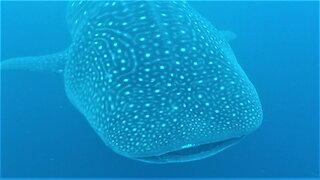 0:42
0:42
WildCreatures
4 years ago $31.69 earnedMassive whale shark swims directly under surprised scuba diver
13.5K5 -
 1:52
1:52
WPTV
4 years agoEndangered sea turtle concerns grow as holiday beachgoers increase
19 -
 0:50
0:50
cdngreenwaterdiver
4 years ago $1.04 earnedDiver hand feeds world's most dangerous shark
4.61K7 -
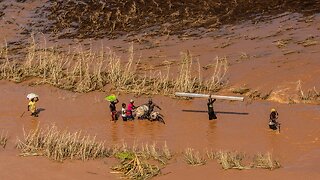 1:09
1:09
Newsy
4 years agoUN Report: Climate Change Could Force 120M People Into Poverty By 2030
485 -
 1:24
1:24
WPTV
4 years agoNo swim advisory issued for Carlin Park beach in Palm Beach County due to bacteria
18 -
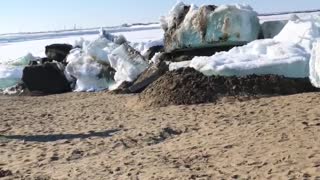 1:49
1:49
ViralHog
4 years ago $16.26 earnedIce Tsunami Comes Crashing In
37.7K1 -
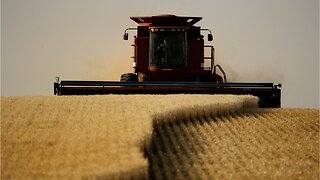 0:39
0:39
WochitNow
4 years agoAgriculture Department Hiding Negative Effects Of Climate Change
151 -
 1:42
1:42
WFTX
4 years agoCONCERNS OVER FLESH-EATING BACTERIA AT BEACH
80 -
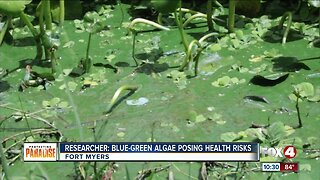 1:46
1:46
WFTX
4 years agoExperts discuss health effects from toxic algae blooms
19 -
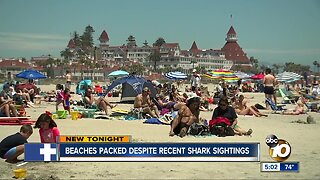 2:37
2:37
KGTV
4 years agoBeaches packed despite recent shark sightings and stingray warnings
20